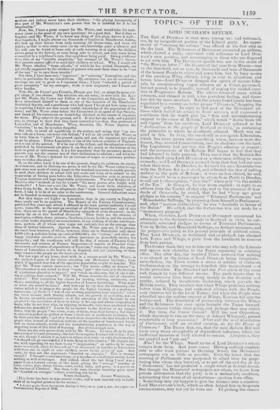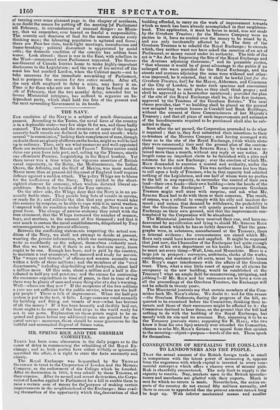TOPICS OF THE D
LORD DURHAM'S RETURN.
THE Earl of DURHAM is once more among US ; and welcomed, too, by no insignificant portion of the Liberal party. An opportunity of " showing his colours" was offered at his first step on the.dry land. Tite Reformers of Devonport resettled an address, which elicited a reply, imaortant with reference to Lord Dnait AM'S own positions, anti encouragiwr to those who are disposed to act with him. The Devonport speech was not in the strain of " the BowLnv letter ! " Ott his arrival last year from Ressia—met on the threshold, not as now, by thousands and tens of thousands of the honest People to cheer and nerve him, but by busy scouts of the sneaking Whig officials, In jog in wait to misinform and betray him—Lord Dranast damped the spirits of sincere Liberals, by recommending vague reliance on a Court, presinned, but not proved, to bo friendly, instead of urging the needed exertion in Progressive Reform. Tine advice favoured many selfish
interests, and chimed in with a too prevalent feeling, and there fore did the more mischief. But the return from Canada has been signalized by a recurrence to the proper " Duan ate," dropping the " BowLny" policy. In reply to that part of the Dcvonport address whieh hailed his return to ionize services, and expressed a confidence that he would give his " firm and uncompromising
support to the cause of' Reform," which would •" derive fresh life and vigour" from his exertions, Lord DURHAM referred to his " declarations to The people if Scotland in IS:34," as containing the principles to which he steadfastly adhered. Much was implied in this. In 1 s3, the stand-still or retrograde Liberalism, which has since grown into something worse, because more dishonest, titan avowed Conservatism, cosi its shadows ever the land. The Legislature bad not won the People's affection or respect ; and the conquerors of the Reform Bill began to feel that they had laboured to little purpose. Then was it that the Scottish Reformers fixed upon Lord DURHAM as a statesman willing to move onwards; and Lord DuRH km assured them that they had not mistaken their man. At Dundee, be declared his own dissatisfaction with the Reform Act as it stood, and ridiculed the idea of halting midway in the path of Reform: it were no less absurd, he said, than it would he itt a passenger by stem from Perth to Dundee, to call out to the engineer, " stop her !" when only "in the middle of the Tay." At Glasgow, he was more explicit : in reply to an address from the Trades of that. city, and in the presence of bun dreds of thousands, Inc stated, that Inc bad " lining ago given pledges to his country " to support " Triennial Parliaments" and "Householder Suffrage," by proposing them himself in Parliament ; and, after "mature deliberation," he was "decidedly in favour of the Ballot." He added, that the declaration was not made for a "momentary purpose." When, therefore, Lord DURH si at Devonport announced his adherence to the declarations made in Scotland in 1834, he substantially reiterated pledges in favour of Triennial Parliaments, Vote by Ballot, awl Household Suffrage, as distinct measures, and tine progressive policy as his general principle of political action. That Lord DURHAM, so welcomed and so pledged, has alarmed both Tories and Whigs, is plain from the treatment he receives from both parties.
The former think they see in him one who may rally the Liberals and oppose new obstacles to the Tories regaining or retaining
Day after day, the troubled Times protests that nothing is so absurd as the notion of' Lord DuanAm being formidable : nevertheless, the Times wastes a series of articles of elaborate workmanship on the attempt to demolish this insignificant a.id feeble pretender. The Standard awl tine Pria strive at the same end, though by very different means. The party knows that its recent successes have been owing mainly to the disunion and apathy, induced by treacherous leadership, whirls pervade the Reform ranks. They recollect that when Whigs professed not i ng better than Whiggery, and eschewed alliance with the People, easy victories fell to the lot of Tories; but when tine People were wheedled into the zealous support o VIfigs, Toryism fell into the background. The dissolution of partnership between the Whigs and the Reformers Inns once again brought the Tories forward. Office is almost within their grasp, and perhaps they may clutch it. But then, tine tenure thereof? Will the new Opposition, which threatens to rise on tine ruins of defunct Whiggery, permit comfortable or long possession ? What will the neut. dissolution if Parliament, with an excited country, do for the House of Commons? The Tories fear, too, that the next Reform Bill will carry away many strongholds 1/f oligarchical influence, which the inefft.ctual measure of' 1832 allowed to remain. Altogether, they are puzzled and "put out." Alas ! for the Whigs. Small notice of Lord Dunn va's 'totem escapes from them. And pour cause. Having nothing comfortable to offer their patrons in Downing Street, the Ministerial newspapers say as little as possible. Even the taunt that the meeting of Parliament was postponed to afford time for propitiating him whom they betrayed, or to put off the evil day of his " disclosures," has not produced a single retort or distinct denial. But though the Ministerial newspapers are silent, we know from private information that the party is in a melancholy condition, anticipating that worst of all misfortunes—ejection from office.
s Something may yet happen to give the doomed men a reprieve. Lord Illittnorasre's luck, which so often helped him in desperate circumstances, may not yet be worn out. To prolong the chance
of turning over some pleasant page in the chapter of accidents, is no doubt the reason for putting off the meeting of Parliament till February, in circumstances of unusual danger : no Ministry, that we remember, ever braved so fearful a responsibility. The scarcity and dearness of food for the masses alarms every thinking man ; the labouring population is agitated and fierce; there are Poor-law riots, torch-light meetings, incendiarism and frame-breaking: political discontent is aggravated by social evils; the domestic condition of the country has seldom been worse. Look abroad there is war in the East, with rebellion in the West—commenced since Parliament separated. The Governor-General of Canada hurries home to make highly-important disclosures to the Legislature; and the news of his arrival off the coast has but reached London, when the Cabinet meets—not to take measures for the immediate assembling of Parliament, but to postpone the session for two entire months. After all, the very shift employed to delay a crisis, may hurry it on. Time is for those who can use it best. It may be found on the ath of February, that the two months' delay, intended but to favour Ministerial intrigues, has sufficed to organize an Independent party, which shall hold the fate of the present and the next succeeding Government in its hands.



























 Previous page
Previous page